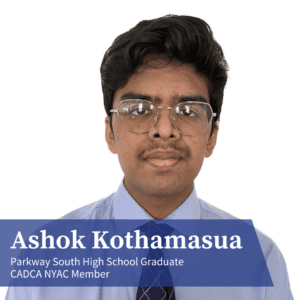
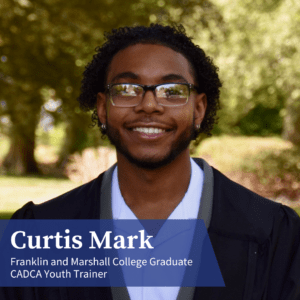
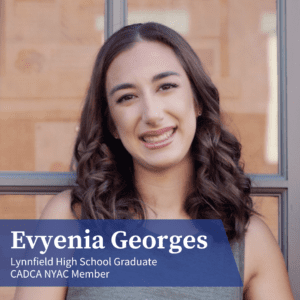
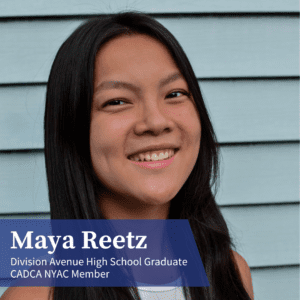
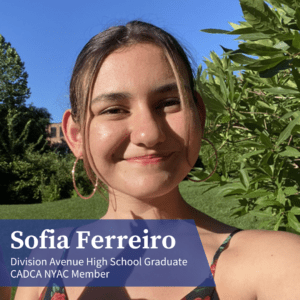
Celebrating and Highlighting the Graduates
- Where did you graduate from and what are your current fall plans?
- How did you get involved with the coalition in your community?
- What was your most memorable experience with CADCA?
- What advice would you give to your younger self upon entering the prevention field?
- What are some of your goals you have set for the next stage in your life?
- What’s a prevention initiative, event, or project that you’ve been involved in that you are most proud of?
Curtis: On May 13, 2023 I became a first-generation college student! I graduated cum laude from Franklin and Marshall College in Lancaster, Pennsylvania with a degree in Public Health and Biology. For the upcoming fall I plan on working at Atlantic Health System in New Jersey to further their mission to improve equity throughout the different hospitals and clinics.
Evyenia: I recently graduated Lynnfield High School and I am now off to The University of Massachusetts Amherst in the fall.
Ashok: I graduated from Parkway South High School in Ballwin, Missouri. I will be pursuing a medical school education in tandem with a liberal arts degree at the University of Missouri Kansas.
Maya: I graduated from Division Avenue High School in Levittown, New York. In the fall, I plan on attending the University of Southern California. I am extremely grateful for the opportunity to study mechanical engineering at USC Viterbi on a full merit-based scholarship.
Sofia: I graduated from Division Avenue High School in Levittown, New York, and will be pursuing my bachelor’s degree in Political Science at the University of Central Florida this fall.
Curtis: In 7th grade I joined my community’s coalition, ADAPT, in an effort to combat underage drinking in Orange, New Jersey. We worked diligently to involve different sectors of our community to improve its overall health. Additionally, I became the youth chair for the statewide coalition, NJPN, where we were able to assess the needs of different counties and direct our resources to address their issues.
Evyenia: I got involved by reaching out to find out more about the coalition. When I joined, I found a new home within my community where I could work with others to create impactful change. I was interested in the topics the coalition focused on based on my personal and family experiences.
Ashok: I joined a club known as Teen Voices for Change my Sophomore Year. It was a healthcare advocacy club that was linked to my community’s coalition known as Alliance of Healthy Communities. They sponsored my first Mid-Year, and they connected me to local prevention advocacy groups.
Maya: After seeing firsthand how substance misuse can ruin relationships, I became motivated to make my town a safer and more supportive place with invaluable resources to help those struggling. In the summer after ninth grade, I decided to join my local coalition called Levittown Young Organizers United to Help. My friend, Sofia Ferreiro, was a member of L.Y.O.U.T.H. and encouraged me to raise awareness of drug misuse in our community.
Sofia: When I was in middle school, my school’s social worker introduced a few of my classmates and me to the Levittown Community Action Coalition. However, it wasn’t until my freshman year that I had really gotten involved with them.
Curtis: My most memorable experience with CADCA was when we trained youth from different regions in Africa at the ISSUP conference in Nairobi, Kenya. It was inspiring to see what initiatives were being done on a global scale to combat the issues present in these areas. This experience also taught me the importance of being culturally competent and embracing our differences to create population level change.
Evyenia: While I will cherish all of my memories with NYAC and CADCA, I will always remember our Webinar Wednesday Zoom with Dr. Gupta from the ONDCP where we discussed the current fentanyl crisis.
Ashok: One of the most memorable experiences I had with CADCA dealt with the specialized Healthcare Equity track that was hosted the first time I attended Mid-Year. It ended with a capstone research project on how equity must reverberate not through actions but also leadership. It was truly a great opportunity to present to the Mid-Year audience and a CDC director.
Maya: My most memorable experience would be the time I was selected to be a youth representative for SAMHSA’s Prevention Day panel. I was able to discuss pressing topics such as intersectionality at the 2023 CADCA National Leadership Forum Opening Reception. The session entitled “How Identities Intersect and Interact in Prevention Strategies for Youth and Young Adults” allowed me to talk about my prevention work and encourage young adults to learn how intersectionality plays a role in this line of work. It was inspiring to hear the stories of other panel members, and it was a very unique opportunity that I am grateful to have taken part in.
Sofia: My most memorable experience with CADCA had to have been when I spoke at the Drug-Free Kids Dinner in Washington DC. I was truly honored to have just been invited, let alone speak and allow my family to take part and see the work CADCA does. It was a really memorable time and being my family and the people I have worked with for so long all together was simply incredible.
Curtis: The advice I would give to my younger self would be to stay open-minded, humble, and motivated because one conversation you have with someone can be the determining factor in the decisions they make. I would also tell my younger self to continue to advocate for those who cannot advocate for themselves. The battle against substance misuse is not a 1-person journey, but rather it takes a village to truly impact the health of our communities.
Evyenia: I would immediately encourage my younger self to embrace all new experiences to get involved in the community. This way I could hear all different perspectives on topics from a variety of people with different backgrounds.
Ashok: Be vocal! I think it is important to hold opinions about prevention and implementation. Oftentimes, prevention is directed towards youth. However, the implementation often lacks a youth stakeholder. Make it your effort to have a say in what is being done, as you can have an impact on your community.
Maya: The best advice I can give anyone in the prevention field, including myself, is to listen more. Sometimes listening is better than anything you can say because, by lending an ear, you are saying that you care about what people have to say and that their experiences matter to you too. Hearing people’s experiences can teach you how to help people, understand another person’s point of view, and become more empathetic.
Sofia: The biggest piece of advice I’d give my younger self is that you can’t know everything all of the time and that it’s okay. As a leader in my coalition’s youth sect, I oftentimes had to take the initiative and make decisions about different plans and projects for prevention. There were a lot of opportunities missed for us because I was scared and unsure if the project would work or if the community would outright reject it, so there were a lot of things I just never brought up. In retrospect, I realize that it is impossible to know exactly what does and does not work for people and that the only way to know is to try. If it goes wrong or the idea gets rejected, it does not represent a failure on your part, it’s just an opportunity to reevaluate and try again.
Curtis: For the next stages of my life I plan to enroll at the Dartmouth Institute for Health Policy & Clinical Practice to get my Masters of Public Health. Upon receiving this degree I will begin medical school to achieve my dream of becoming a physician. Throughout these next few years though I am prioritizing my mental well-being and improving my character to be the best advocate that I can.
Evyenia: I hope that my biology major will allow me to stay connected to the prevention field as I aim to connect it to my job in the future. I hope to learn from others as I explore all of my academic interests. I also hope to branch out with others as I leave my small community.
Ashok: I hope to integrate prevention in my professional and daily life. This might be through research, community service, or literature.
Maya: A goal of mine is to continue prevention work in Los Angeles, which will be my new home for the next four years. Los Angeles, like many large cities, has a large population that struggles with drug misuse. Through the many community service opportunities USC offers, I plan to integrate myself into the surrounding community, learn about their culture, and find ways to best serve them.
Sofia: My biggest goal as I enter college is to definitely continue my work in prevention. I am leaving my hometown this summer as my family and I are relocating to Central Florida. For this reason, I cannot work with the Levittown Community Action Coalition anymore. Nevertheless, I hope to continue working with CADCA and a local coalition near my school. The work I have done these past four years in the prevention field has been incredibly rewarding. Being part of the NYAC over the past two years has also been life changing, and I hope to bring the knowledge and first-hand experiences I have gained to my new community and wherever else life takes me.
Curtis: My favorite prevention initiative I have taken an active role in was the community sticker shock campaigns I conducted along with my local coalition. We formed many relationships with youth, business owners, and law enforcement and this experience is what exposed me to the beauty of community partnership.
Evyenia: Outside of my work at CADCA, I am most proud of the testimony I gave at a Massachusetts state education hearing to advocate for more mental health education in public schools across the state. I will always be grateful for my work with CADCA, A Healthy Lynnfield, Wipe Out Stigma, and The 84 Movement.
Ashok: I believe I am most proud of the youth-led effort on helping pass a Prescription Drug Monitoring Program in Missouri. Missouri was the last state to pass such comprehensive legislation. It was truly eye-opening to have conversations with legislators about prevention and the effectiveness of the policy. It was a grassroots campaign that was strengthened by testimonials and stories behind raw data. Discussions with legislators were sometimes inconclusive but some often veered into a path of understanding the impact of the program.
Maya: I am most proud of the partnership project with HOSA, for which I am grateful to have been a mentor. Through this nine-month mentorship program, I have gained leadership skills while also learning so much. I admire the hard work of both my Youth Trainer Advisor, Andrea, and my HOSA mentee, Jocelyn Auxier. We were instructed to create a project to initiate a positive change in the mentee’s community and spread awareness of drug misuse. This project required both creativity and endurance. At times, there were obstacles, but the three of us persevered. I believe we were able to make Jocelyn’s community more united and more aware of the detriments of substance misuse. Thanks to the handbook Jocelyn created to teach others how to do the same, I believe a difference will be made in many other communities. Words cannot express how proud I am of Jocelyn, how much I value the skills I have learned from Andrea, and how thankful I am for the opportunity to work and grow with both of them.
Sofia: The project I have been the most proud of is the founding of the Levittown Young Organizers United to Help, or LYOUTH. During the pandemic, I, alongside a few of my classmates, saw a lot of our peers struggling with their mental health and turning to drugs and alcohol to cope. Unable to sit by and watch, we worked with the Levittown Community Action Coalition to create LYOUTH as a youth sector of the coalition, whose goal it was to get kids to talk about mental health and positive ways to cope. We met over Zoom in the beginning and watched our numbers soar. LYOUTH was my passion in high school, and watching it grow, spread, and become known in the community was unbelievable. What makes me the proudest, however, was its sustainability. I recently passed the presidency down to two underclassmen in the community, and watching their drive and initiative, comparable to my own when we started, ensured me that LYOUTH is in good hands and will continue to flourish as I move on.


